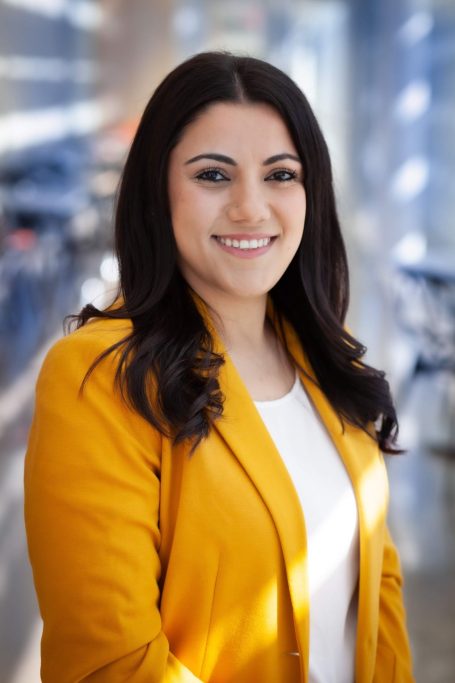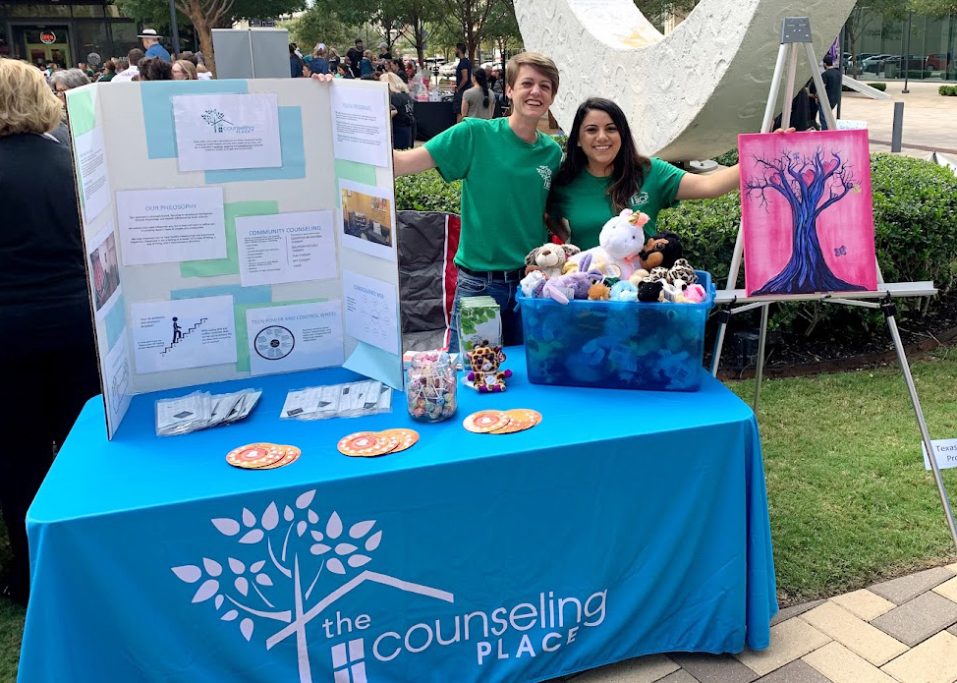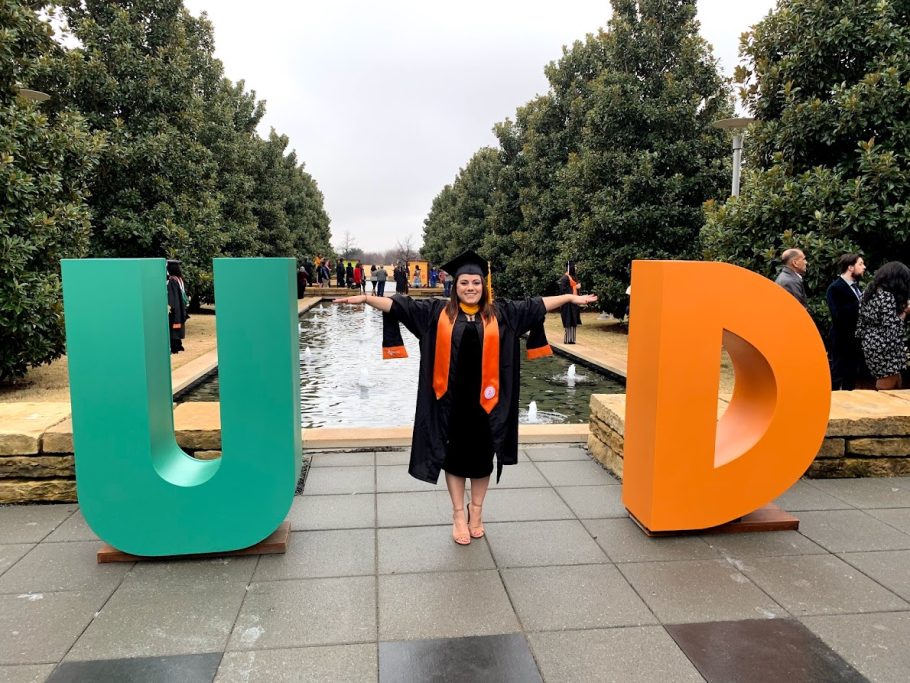Youth Advocate Teaches Students the Power of Positivity
By: Jeff Joiner | October 6, 2023

Lorjon Ali BA’17, MS’18 has known trauma in her life. Beginning with a war in her native Iraq that forced her and her family to move to the United States as refugees when she was a young girl, her childhood was difficult, she recalled. But escaping a war and learning a new language and culture instilled an inner strength in the young Lorjon that she’s now passing on to adolescents she works with as a youth advocate.
Lorjon was born in Iraq and left the country with her family when she was just 4 years old, arriving in the United States in 1997 as part of Operation Pacific Haven following the Gulf War.
“My father had joined a volunteer medical team sponsored by the United States and the United Nations, but when tensions between Iraq and the United States escalated, we were swiftly evacuated from the country,” she said.
Lorjon and her family found refuge in Guam for three months, awaiting the processing of their immigration documents, before making their way to Dallas.
As Lorjon grew up in what was, to her, a strange land, she admits she was a bit of a troublemaker, but by the time she was a student at J.J. Pearce High School in Richardson, Texas, she realized her actions would impact her entire life from college prospects to career opportunities. She now works with young people to help them realize that their first-time run-ins with the police don’t have to lead them to serious, life-altering trouble.
Lorjon is the director of youth programs at The Counseling Place in Richardson, where she works with young people ages 11 to 16 who have gotten into trouble with the police for the first time. She leads her students through a six-week, one-on-one enrichment program called Project Positive that teaches them how to think differently about their emotions and relationships.
“I’m teaching them that what they do now is planting the seeds for their future, good or bad,” Lorjon said. “I talk about emotional intelligence, brain development, making better decisions, managing emotions, actions and consequences and knowing the difference between healthy and unhealthy relationships.”
The Counseling Place contracts with the City of Richardson to manage the city’s First Offender Program for juveniles who have committed minor offenses such as fighting, theft less than $100, trespassing, possession of drug paraphernalia and other violations considered class C misdemeanors. As first offenders, adolescents have their offenses dismissed from their records once they complete the program.

Deborah Dobbs, executive director of The Counseling Place and developer of the Project Positive program, praises Lorjon for her dedication to the youth she works with.
“Lorjon has utterly transformed our youth program,” Dobbs said. “She helped us strengthen the Project Positive curriculum, and the young people in the mental health education and enrichment course know that Lorjon really cares about them.”
For the students in the program, Lorjon may be an authority figure that they are required to meet with, but she has developed the ability to encourage young people to open up to her and share details of their lives that perhaps led them to getting into trouble.
“‘You’re not a criminal,’ I tell them. ‘What you did is not who you are,’” Lorjon said. “I don’t want them to ever feel judged. After all, we were all kids at one point, and I know I wasn’t the perfect angel when I was growing up but look at where I am now.”
Project Positive stresses the importance of the mindset that young people can adopt allowing them to control their emotions and develop healthy coping skills. Lorjon describes brain anatomy and development in a way that is relevant and helps them understand how brain function affects emotions.
“We talk about what’s going on in their brains in detail,” she said. “I describe their brains in terms of when emotions escalate, and I explain what the amygdala does and what the hippocampus does and their involvement in emotional control. I break it down so they’ll understand it.”
Lorjon’s program also requires her students to write about what they’re grateful for in a daily journal. She said thinking about what you’re thankful for improves a person’s outlook.
“We talk a lot about gratitude because it rewires the brain and you begin to see things around you differently,” she said. “Writing in the gratitude journal makes them think about their entire day and it allows them to be present.”
One high school student Lorjon met with who was assigned to The Counseling Place for fighting in school said the program changed how she thought about herself and the need to control her anger.
“This program has definitely helped me be more secure in my self-awareness,” she wrote in a self-reflection paper for the class. “I realized that nobody was worth me bringing out that side of myself, ever.”

Many of Lorjon’s approaches to working with her young students are influenced by her time at the School of Economic, Political and Policy Sciences UT Dallas where she earned bachelor’s and master’s degrees in criminology with a minor in psychology She said she was especially influenced by her mentor, former UTD criminology instructor Amny Shuraydi PhD’18 who helped her master often difficult theories in her classes.
“She let me know that it was OK to not understand something,” Lorjon said. “There were a lot of times and a lot of email threads where she was like, ‘This is what this means, and this is what’s important.’ She was able to break things down for me, which I guess is where I get that from in how I work with adolescents.”
Lorjon added that her UT Dallas education was instrumental to her success at The Counseling Place following an internship there as a master’s student. Many of the concepts she learned in criminology and psychology have fit well into Project Positive. Dobbs said Ali excels at connecting concepts to each student in the program.
“Lorjon has helped us strengthen the curriculum, but even a fantastic curriculum will fall short if it isn’t delivered well,” Dobbs said. “She personalizes the content for the students by learning about their dreams and goals. This helps with rapport but also makes the content more relevant.”
For Lorjon, her relationship with students doesn’t end after six weeks. She checks in with her students and their parents six months after they finish the class, which often provides evidence of the program’s impact. She said she is especially happy when students tell her about achieving goals they talked about in class.
“Seeing their accomplishments after finishing the program makes me glad they were in the class,” Lorjon said. “They’ll tell me they got a job or made the football team or something like that. They want to share achievements with me, and that’s exciting.”